BY AMY DAWES
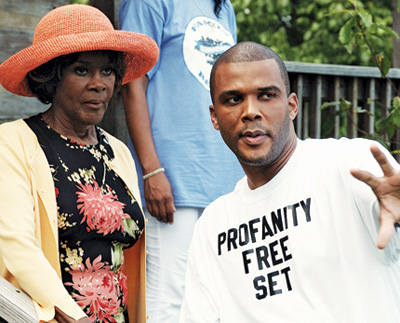 Tyler Perry's films often shift tone quicky between comedy and melodrama, as they do in
Tyler Perry's films often shift tone quicky between comedy and melodrama, as they do in
Madea's Family Reunion, with Cicely Tyson. (Credit: Alfeo Dixon/Lionsgate Films)Tyler Perry likes to tell the story of how, while performing in a movie recently, he committed a classic filmmaker's blunder: He got mixed up on his lines, and in frustration, yelled 'Cut!' The problem was, he wasn't on his own set. He was acting a small role as the Starfleet Commander on the set of J.J. Abrams' Star Trek. "Everybody looked at me like, 'Who does he think he is?'" Perry remembers. "Except J.J.—he started laughing and he just said, 'Cut, guys, cut.'" It isn't the mild embarrassment of his gaffe that makes the moment resonate with Perry as much as something else it revealed: "It turned out nobody else on that set knew who I was—not one person," he laughs. "I had one guy say to me—and this was a black guy—'Wow, man, it's great that you got this gig. Did you go to an open call or something?' Another guy was chatting with me and I said, 'I really like it in Canada. Maybe I'll try to buy a cabin here,' and he said, 'Oh no, man, you gotta be rich to buy something up here.'"
That remark would be greatly amusing to Perry's pals like Will Smith and Oprah Winfrey, and to many people in Atlanta, where Perry lives and works, presiding over his own production studios and a fast-growing media empire. Ebony magazine, which covers Perry regularly, reported his personal earnings at $125 million for last year alone. But between Perry's world and the usual world of show business there remains a great divide, which may be why he savors the story. After all, you don't tend to become a maverick unless you enjoy your outsider status.
Although he may be more visible as an actor, writer and producer, Perry has directed most of his movie, television and stage projects—and adeptly branded them with his name along the way. He says directing is something he's learned by doing. "It's all been guerilla, my training has been on the job. I've always been a very visual person, and I just approached it as, this is what I want it to look and feel like."
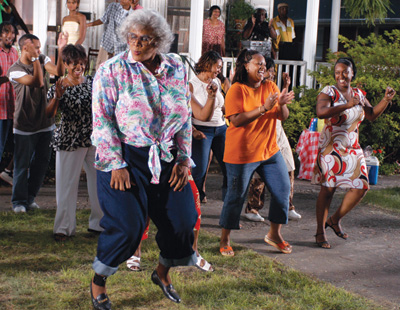 IN CONTROL: As the director, Perry knows exactly what he needs when he puts on
IN CONTROL: As the director, Perry knows exactly what he needs when he puts on
spectacles and a skewed silver wig to play Madea in Diary of a Mad Black Woman.
(Photo Credit: Alfeo Dixon/Lionsgate Films)The burst of comic energy that has helped fuel Perry's ascent started nearly a decade ago, when he wrote and performed a new character for a stage play he was doing on the chitlin circuit that has launched many a black entertainer. His invention was an incorrigible, trash-talking, pistol-packing grandma who raises her own brand of hell while also doling out moral and spiritual advice to family and friends. Perry, who was barely 30 years old then, put on a matronly dress, spectacles and a skewed silver wig to play the character, whom he called Madea. Because he stands an intimidating 6-foot-6, the effect was as funny as Madea's motormouthed malapropisms. The cigarette-waving senior first appeared in his 1998 play I Can Do Bad All By Myself, and quickly became beloved—she has played a role in the majority of his stage plays and movies since, and made occasional appearances on House of Payne, one of the two television series he cranks out for TBS.
Perry often says he is tired of playing Madea, but his audience is insatiable in its demand for more. He frequently plays other characters in his movies, such as Madea's pot-smoking elderly brother, Joe, and her clean-cut attorney nephew, Brian. This requires him to not only direct himself, but to direct several versions of himself—often while wearing heavy makeup and drag, and often with two or more characters he portrays appearing in the same frame, along with other actors.
He credits Eddie Murphy as an inspiration, saying, "I wouldn't have even realized this was possible if I hadn't seen Eddie do the Klumps," referring to the fat-suited Sherman Klump and his family members, all portrayed by Murphy in his two Nutty Professor movies. But the career of Jerry Lewis, who in turn inspired Murphy, may hold more parallels. Like Lewis, Perry directs his movies as well as produces, writes and stars in them. And like Lewis, he is one of those directors whose popularity as a comic performer has made his name recognition enormous. It's enabled him to build a brand that holds great sway with his audience, which for the most part is female, Christian and African-American, though there is certainly some diversity in the mix.
Perry initially built his following on the live theater circuit, an arena in which many of his unconventional impulses took root. Night after night, city after city, show after show, he was getting direct feedback on what was and wasn't funny and what did and didn't move people. His shows mixed broad comedy and melodrama with gospel-influenced musical numbers. As Madea, he would regularly "break the fourth wall" to counsel audience members on dealing with life's challenges. The shows became phenomenally popular, drawing 30-40,000 patrons a week in touring productions. "Long before I ever did a movie, I was hugely famous with African-American people," says Perry. "I could not walk down the street in most major cities without being mobbed. I was bigger than the fifth Beatle."
Most of his movies have been adapted from the stage productions, but Perry lets the content diverge widely from one medium to the next. "The plays were done so early, and I've grown a lot since then," he says. "So in writing the film, if it comes out another way, I just go with it."
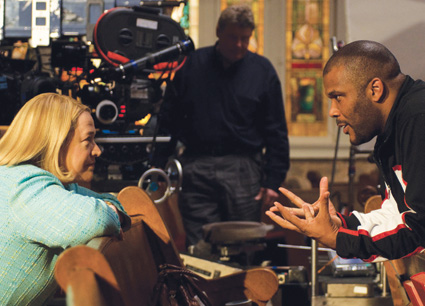 Perry works with Kathy Bates in The Family That Preys. (Credit: Alfeo Dixon/Lionsgate Films)
Perry works with Kathy Bates in The Family That Preys. (Credit: Alfeo Dixon/Lionsgate Films)As a performer himself, he's able to set the tone for the rest of the ensemble simply by asserting Madea's considerable presence, and much of the comedy flows from the way he prods, cajoles, insults and engages the other performers in verbal sparring matches that are often largely improvised.
"A lot of times he'll give me the bare bones of what he wants, and then allow me to create the scene with him," says David Mann, who plays the portly, good-natured, bald-headed neighbor Madea torments and abuses in several films. "Most of the stuff is basic, and then he'll go off script and ad-lib it, say a lot of wacky stuff to make us laugh and throw a little surprise into it."
Beginning with the musical stage productions, Perry says, "I've worked with a lot of people who weren't really actors—they were singers, but I got some amazing performances out of them, and so I learned how to do that along the way."
He says he often engages in a bit of social research to open the door to an effective performance. "I'll have dinner with a performer and find out whatever I can about them—what they care about, what they're going through, what's the worst thing that ever happened to them. They don't know what I'm getting the information for, but then I'll use it. For example, in a scene, if I'm not getting what I want, I might stop and whisper something in the person's ear, and then call 'Action.' And that'll be the moment when it happens."
As a self-taught filmmaker, Perry sees his work with actors as his strength. "I'm great at getting a performance; I can really direct a person to an emotional scene, but on the technical side, I'm not very well-versed. I can't even watch my first film [Madea's Family Reunion] because the camera angles are so bad. On (subsequent movies) Daddy's Little Girls and Why Did I Get Married?, I tried to experiment more with depth of field and camera movement. Directing is truly an art, and people who do it well should be celebrated."
Indeed, Perry's most salient characteristic as a director may be the speed at which he accomplishes things. His output is becoming legendary. Last year, for example, he directed 100 episodes of House of Payne—fulfilling a deal that moved it swiftly into syndication—while also turning out two movies.
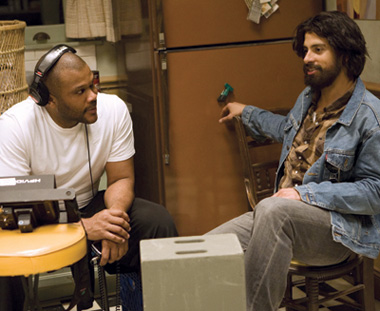 Perry works with Adam Rodriguez in his latest film, I Can Do Bad All by Myself.
Perry works with Adam Rodriguez in his latest film, I Can Do Bad All by Myself.
(Photo Credit: Quantrell Colbert/Lionsgate Films)"It's done at a very fast pace—we call it the Tyler Perry Pace," says Mann. "It takes some getting used to, or you could be overwhelmed."
Meet the Browns, in which Mann stars, is 'stripped' on TBS, meaning it runs five evenings a week. To keep up, Perry shoots an episode a day of the half-hour comedy several times a week on the Atlanta stages.
"We go in in the morning, do a script read, then do a rehearsal and camera block, and then shoot it in the afternoon," says Mann. "Sometimes Tyler will be writing on the spot; he'll say, 'Let's move this and do it this way instead,' and he'll call 'Action.' You have to be ready, and have your mind prepared to really pay attention."
"After we block the show I'll leave and let them rehearse it," says Perry. "I'll go up to the office, do some writing and other work, take meetings, and then come back at 2:30 to shoot the show. We're usually done by 5:00. If I'm shooting a movie at the same time, I'll leave the show at 5:00 and go next door to whatever set the movie is on and work until maybe midnight."
Needless to say, there isn't a lot of re-shooting. "If I'm doing more than three takes, there's something wrong," says Perry. "I'm a two-take guy. The first take is just as it's written, and the second take is usually improvising. And then we go on. That's why I'm able to make movies for $12 million." Typically, the movies are shot in thirty days, with eight weeks of prep time. Perry has been a DGA member since directing his first film and says the support of a guild "that recognizes that I'm different and accommodates that has been a great joy."
Mann says that while Perry sometimes indulges in more takes on his movie sets than in his TV work, there is generally little difference in the pace between the two mediums.
"He does do multiple takes on the movies if we need to, but in between you don't sit for five hours and wait. He's like, let's shoot it and move on," says Mann. "Since he's an actor, he knows what it's like to have to wait. And since he's the writer and the director, he's got in his mind exactly what he wants. He doesn't like to waste a lot of time."
Perry says maintaining a consistent core crew is part of the reason he's able to work so quickly. "My editor, Maysie Hoy, and I have worked together since my second movie, and we're so in sync that she could practically cut without me—I just come in to look at it and make minor tweaks," he says. He also cites producer Reuben Cannon, 1st AD and co-producer Roger Bobb, DP Toyomichi Kurita and production designer Ina Mayhew, all of whom have worked with him on multiple film productions, as key to his process. In fact, Perry says, finding people who are capable but not entrenched in "the Hollywood mentality" is one of his biggest challenges. "If I tell people who've worked on Hollywood sitcoms that we're doing four shows a week, they think I'm crazy," he remarks. "But if they've never done it before, they think, 'Wow, cool, this is the way it's done.'"
While comedy is a mainstay, Perry movies also include a lot of melodrama, and often shift tone quickly. An emotional scene, for example, will be followed by one featuring Madea's irreverent hijinks. "I take a lot of flack because people think I don't know what I'm doing, but it's very deliberate," he says, explaining that he's guided by the instincts he honed doing live theater. "I can feel it when I'm taking the audience too deep or too low, and then I want to take them up again. I know when people need to laugh.
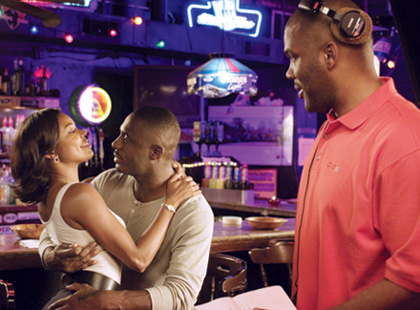 FALLING IN LOVE: A mechanic and his lawyer fall in love in Daddy's Little Girls.
FALLING IN LOVE: A mechanic and his lawyer fall in love in Daddy's Little Girls.
(Photo Credit: Alfeo Dixon/Lionsgate Films)"People think there are so many rules," he continues, "but who set these rules? I don't understand that. Why can't they be broken? I have done it my own way, and it has served me very, very well."
His years on the road, he believes, have taught him how to connect with an underserved audience in a way that makes criticism irrelevant. "I'm talking to people who have been disenfranchised, who have not seen themselves represented in entertainment, and have not been spoken to," he says. "Not just black people, but anyone who's been in these situations, or has these family members. The people who it's for get it."
It helps, too, that his audience knows what to expect from him. His 'brand' is so entrenched that Blockbuster files his DVDs under 'T' for Tyler Perry. Video versions of the plays are widely distributed via the Tyler Perry Collection label, alongside movie versions of the same titles, distributed by Lionsgate Films. Perry is adamant that directors should recognize the importance of building a brand, as he has done from his earliest days on the theater circuit. "From day one I would tell the promoter that my name needs to be on the ticket and on the marquee," he says. "They thought it was about ego, but there were so many plays out and I needed people to know that when they heard this name, they would get something special and get their money's worth."
To other directors, he says: "You have to use the system to build your brand, so that if you leave that studio, you take your brand with you and the studio has helped you build it." Much has been made of the unusual and highly favorable deals Perry has been able to make by retaining significant ownership of his properties. "Ownership makes the difference in everything," he counsels. "From whether it's true to your vision to how much your children and grandchildren will make from it long after you're gone."
His company has recently launched a specialty banner, 34th Street Films, which will produce or present work by other directors. And for the future, he has an eye on the international audience that conventional wisdom says is resistant to African-American comedies. His Star Trek gig, he allows, was part of an early stage strategy to raise his overseas profile so he could possibly appear as an actor in a major global release, perhaps a buddy movie with another star.
But the exposure he's gained to the ways of Hollywood is not likely to change him. "I don't have any interest in directing and writing a movie that costs $110 million to make, because I do not want that kind of pressure in my life," he says. "And besides that, they shoot for months and months. I'd be pulling my hair out."